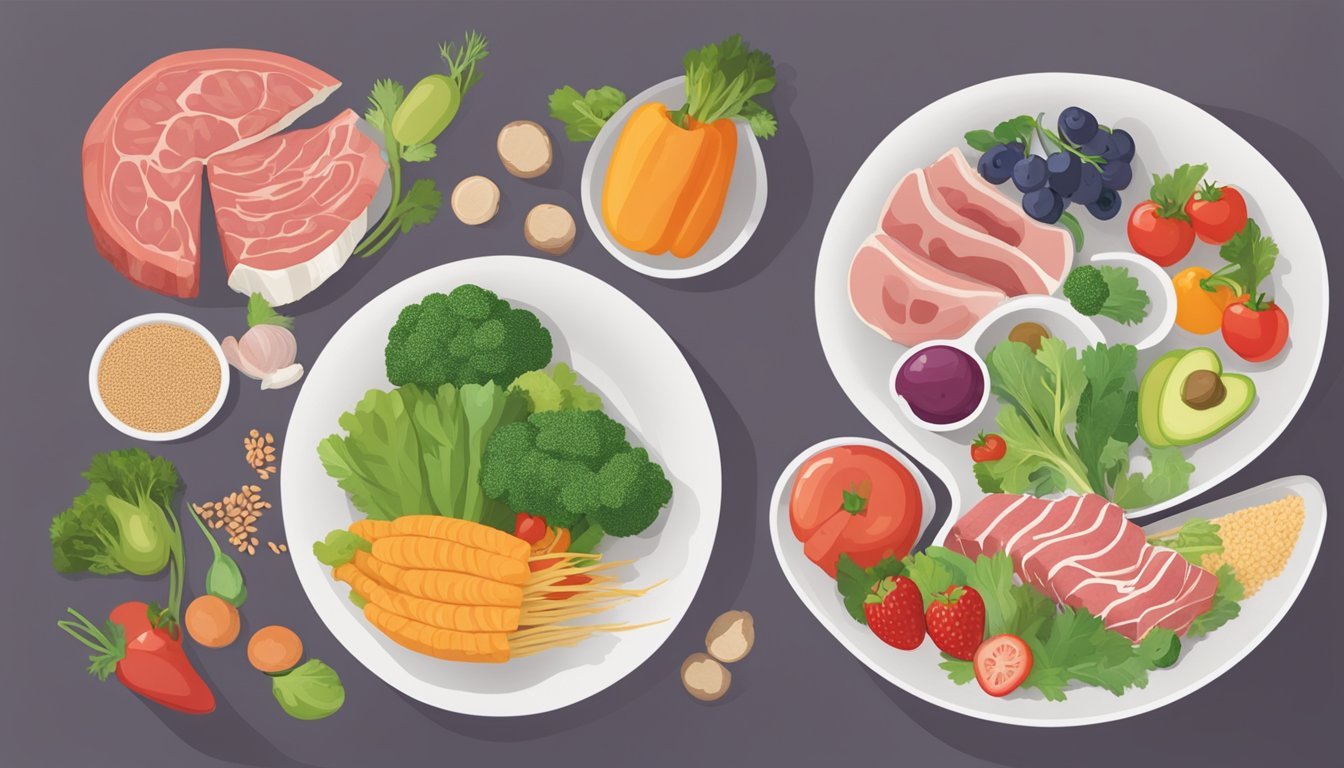Carnivore Diet vs. No Grain Diet
Analyzing the Impact on Digestive Well-being
The Carnivore Diet and the No Grain Diet are both dietary strategies that focus on eliminating specific food groups. The Carnivore Diet is characterized by a menu that consists entirely of animal products, such as meat, fish, eggs, and sometimes dairy. Advocates of this diet argue that it leads to improved digestive health by eliminating inflammatory plant-based foods and emphasizing nutrient-dense animal products.
On the other hand, the No Grain Diet eliminates all grains but allows for a broader spectrum of foods, including meat, vegetables, and fruits. This diet contends that grains can be detrimental to digestive health, leading to inflammation and other gastrointestinal issues. Both diets claim to offer digestive health benefits, anchoring their claims on the principle of exclusion - by removing the alleged irritants from the diet, proponents believe that an individual's digestion can significantly improve.
Comparing these two diets reveals underlying theories about human digestion and the role of different macronutrients in gut health. Each diet presents its own set of guidelines and purported benefits, which have been a subject of debate among nutritionists and health professionals. The impact of these diets on long-term digestive health is a complex matter that requires an examination of individual digestive responses, nutritional completeness, and the balance between the gut microbiota and dietary intake.
What is the Carnivore Diet?
The Carnivore Diet focuses solely on the consumption of animal products and excludes all plant-based foods. It is anchored in high protein intake and lauds benefits such as weight loss and improved blood sugar regulation.
Fundamentals of Carnivore Eating
The Carnivore Diet is a regimen that restricts a person's food intake to primarily meat and other animal products. Its foundation is the hypothesis that human digestion is primarily adapted for the breakdown of proteins and fats as opposed to carbohydrates. Advocates suggest that by eliminating plant-based foods, one might alleviate certain health issues arising from high-carb diets, often blamed for chronic diseases.
Common Foods and Restrictions
Meat: Includes beef, pork, lamb, and game
Seafood: Fish and shellfish
Dairy: Limited amounts, often emphasizing high-fat products such as butter and cream
Eggs: Chicken, duck, and other varieties
Restrictions:
All plant-based foods, including fruits, vegetables, nuts, seeds, grains, and legumes
Processed foods and sugars
The Carnivore Diet is a zero-carb approach that places a strong emphasis on proteins and fats. Foods such as grass-fed beef are valued over grain-fed varieties due to an improved fatty acid profile and higher antioxidant content. It is essential to note that while some may incorporate dairy, it is often in limited quantities to avoid lactose, a sugar found in milk.
Understanding the No Grain Diet
The No Grain Diet is a dietary approach that eliminates grains in favor of whole foods, with an emphasis on meat, vegetables, and fruits. It is designed to reduce processed sugar and carbohydrates.
No Grain Diet Basics
The No Grain Diet eliminates all grains from an individual's meal plan, targeting the reduction of processed sugars and carbohydrates. By removing grains, the diet aims to minimize the consumption of foods that may spike blood sugar levels and promote inflammation. Proponents believe that this dietary pattern can lead to various health benefits, including weight loss, improved blood sugar control, and better digestive health.
Excluded Foods and Reason for Exclusion
Wheat, barley, rye
Reason for Exclusion: Standard grains associated with GI discomfort
Corn, rice, oats
Reason for Exclusion: Common grains high in carbohydrates
Pasta, bread, crackers
Reason for Exclusion: Processed foods derived from grains
Treats, pastries
Reason for Exclusion: Typically contain grains and processed sugars
Beer and grain alcohol
Reason for Exclusion: Made from fermentable grains
Accepted Foods and Exclusions
Under the No Grain Diet, individuals are encouraged to eat a range of whole foods that do not include any kind of grain. The diet emphasizes:
Meats: A variety of animal proteins, including beef, chicken, fish, and eggs.
Vegetables: Both starchy and non-starchy vegetables are generally permitted.
Fruits: Natural sugars in fruits are acceptable in moderation.
Legumes: While technically not grains, legumes such as beans and lentils are often excluded due to their carbohydrate content.
Nuts and Seeds: These are included for their healthy fats, proteins, and fiber.
Inclusion List:
Meats
Examples: Beef, chicken, fish, eggs
Vegetables
Examples: Leafy greens, carrots, broccoli
Fruits
Examples: Apples, berries, oranges
Nuts
Examples: Almonds, walnuts, macadamia nuts
Seeds
Examples: Chia seeds, flaxseeds, pumpkin seeds
It is important to note that while nuts and seeds are permitted, they should be consumed in moderation due to their high-caloric density. Moreover, no artificial sweeteners or processed foods are included in a true No Grain Diet.
Nutritional Profiles Comparison
The nutritional profiles of the Carnivore Diet and the No Grain Diet each possess distinct characteristics, particularly concerning macronutrient ratios, vitamin, and mineral content, as well as the presence of fiber and digestive enzymes.
Macronutrients Breakdown
Fat: The Carnivore Diet typically has a higher fat intake due to the emphasis on animal products. It includes saturated fats, cholesterol, and is low in carbohydrates. Conversely, the No Grain Diet may have moderate to high fat, dependent on the inclusion of nuts, seeds, dairy, and lean meats.
Protein: Both diets are rich in protein, with the Carnivore Diet prioritizing animal-based proteins, which contain all essential amino acids. The No Grain Diet also includes protein but allows for greater variety such as from beans and legumes, provided they are not grains.
Carbohydrates: Intake is markedly low on the Carnivore Diet, as it excludes all plant-based foods. The No Grain Diet reduces carbohydrates by eliminating grains but still includes carbohydrates from other plant sources like fruits and non-starchy vegetables.
Micronutrients and Vitamins
Vitamins A, D, E, and K: The Carnivore Diet is rich in fat-soluble vitamins A, D, and K, found abundantly in organ meats and animal fats. Vitamin E can be lower due to the exclusion of plant-based oils. The No Grain Diet also contains these vitamins but the levels depend on the consumption of a variety of foods such as leafy greens, nuts, seeds, and dairy.
Minerals: Both diets typically provide a rich array of minerals. The Carnivore Diet provides heme iron, zinc, and selenium from meat. The No Grain Diet can be high in minerals, depending on the consumption of nuts, seeds, dairy, and leafy vegetables.
Fiber and Digestive Enzymes
Fiber: There is a stark contrast in fiber intake between the two diets. The Carnivore Diet contains no fiber, as it consists solely of animal products. The No Grain Diet, by elimination of only grains, still provides dietary fiber from fruits, vegetables, nuts, and seeds.
Digestive Enzymes: The Carnivore Diet may have fewer plant-derived enzymes but includes those present in raw or minimally processed meats. The No Grain Diet typically includes a wider variety of digestive enzymes due to the inclusion of a broader range of plant foods.
Digestive Health Assessment
In evaluating the Carnivore and No Grain Diets, their impacts on digestive health are discernible through changes in the gut microbiome, the handling of digestive issues, and the efficiency of nutrient absorption.
Impact on Gut Microbiome
The gut microbiome thrives on a diverse range of fibers and carbohydrates typically found in produce. A No Grain Diet, while eliminating grains, still allows for the inclusion of fruits and vegetables, which can support a diverse microbiome. On the other hand, a Carnivore Diet focuses exclusively on animal protein and may result in a less diverse gut microbiome due to the absence of these fibrous foods.
Influence on Digestive Issues
Individuals with digestive issues like inflammation or irritable bowel syndrome (IBS) might find varying effects between these diets. The Carnivore Diet has anecdotes of reducing symptoms of autoimmune conditions and inflammatory bowel disease, as it eliminates most common allergens and inflammatory foods. Conversely, the No Grain Diet may alleviate digestive troubles for those sensitive to grains while still allowing other fibrous foods that support digestion.
Efficacy in Nutrient Absorption
The nutrient absorption on a Carnivore Diet is centered around highly bioavailable animal protein and nutrients from meat. However, it might lead to deficiencies in certain vitamins and minerals not adequately supplied by meat. The No Grain Diet, while restricting grains, may still offer a broad spectrum of nutrients from other food groups, potentially resulting in more balanced nutrient absorption.
Health Benefits and Risks
When evaluating the Carnivore and No Grain Diets, one must carefully consider the health benefits and risks associated with each. These dietary choices impact weight management and obesity, disease prevention and management, and psychological and mental effects.
Weight Management and Obesity
The Carnivore Diet, which consists of almost exclusively animal-based foods like meat, fish, and eggs, may facilitate weight loss due to its high protein content and potential appetite-satisfying effect. Protein is known for increasing satiety, which could lead to a lower caloric intake. However, the No Grain Diet eliminates grains which are typically high in carbohydrates. This reduction in carbohydrates may lead to a decrease in water weight and a subsequent decrease in overall weight.
Carnivore Diet: Potential for high satiety and reduced appetite.
No Grain Diet: May result in initial weight loss primarily from water weight.
Disease Prevention and Management
The Carnivore Diet offers a restrictive dietary pattern, which some suggest could benefit individuals with autoimmune diseases by eliminating potential inflammatory triggers such as grains and legumes. On the other hand, its high intake of red and processed meats has been linked with increased risks of heart disease and certain cancers due to elevated levels of saturated fats and LDL cholesterol.
In contrast, the No Grain Diet, which might be part of a broader low-carbohydrate or ketogenic approach, has been shown in some studies to improve blood sugar control, which can be beneficial for managing diabetes. However, long-term adherence to a diet devoid of whole grains might miss out on their associated benefits such as fiber, which contributes to overall heart health.
Carnivore Diet: May benefit autoimmune diseases, but risks for heart disease and cancer.
No Grain Diet: Can improve blood sugar control, but may miss out on the benefits of whole grains.
Psychological and Mental Effects
The implications of both diets on mental health are not fully understood, but certain considerations can be made. Individuals on the Carnivore Diet may experience a sense of clarity and focus, potentially from the elimination of food additives and sugars. The No Grain Diet often leads to a reduction in processed foods, which could improve mood and mental clarity.
However, the restrictive nature of both diets has the potential to cause or exacerbate disordered eating patterns. Furthermore, variation in diet is generally considered beneficial for not just physical but also mental health, and the long-term effects of extremely restrictive diets on psychological well-being are still an area of active research.
Carnivore Diet: May improve mental clarity but could lead to restrictive eating patterns.
No Grain Diet: Potential for improved mood but risks associated with dietary restriction.
Critical Analysis of Diet Sustainability
The assessment focuses on the potential environmental impact and long-term health consequences of the Carnivore and No Grain Diets, key factors in determining their sustainability.
Environmental Concerns
The Carnivore Diet demands a high intake of animal products, which strains the environment due to factors such as greenhouse gas emissions and land use for livestock. Research indicates that diets high in meat, especially red meat, have a larger carbon footprint than plant-based diets. Sustainability of this diet is called into question when considering the long-term implications of increased animal farming, such as higher water usage and deforestation.
The No Grain Diet eliminates grains but does not exclusively focus on animal products, allowing for a wider variety of food sources, including plants. A no-grain approach might reduce the environmental impact relative to a carnivore diet, yet the overall sustainability depends on the proportion of plant versus animal intake. A higher consumption of plant-based foods typically leads to a lower environmental burden, considering factors like resource efficiency and lower emissions.
Long-Term Health Implications
Colon Cancer: Diets with excessive red and processed meat consumption, such as the Carnivore Diet, have been associated with an increased risk of colon cancer. The absence of fiber, often excluded in strict carnivore diets, is also a known risk factor for chronic diseases. Conversely, a No Grain Diet, which may include a variety of plant-based foods, can still provide necessary fiber while potentially mitigating some risks.
Chronic Disease: Long-term adherence to a Carnivore Diet raises concerns about the potential for chronic diseases such as heart disease due to typically high saturated fat and cholesterol intake. Conversely, a No Grain Diet that includes a spectrum of plant-based foods may support better long-term health, reducing the risk of chronic diseases by offering a balance of macronutrients and essential fiber.
Sustainability of either diet is not solely based on environmental or health factors in isolation but the interplay between them. The impact of both the Carnivore and No Grain Diets on chronic disease prevalence and healthcare costs also play a role in their overall sustainability.
Personalization and Adaptation
When embarking on a diet such as the Carnivore or No Grain Diet, recognizing that each individual's needs and reactions are unique is crucial. Personalizing the diet to cater to their specific health conditions, lifestyle, and preferences ensures not only greater adherence but also optimized results.
Tailoring the Diet to Individual Needs
Every individual requires a diet that is attentive to their unique physiological makeup. For example, someone with autoimmune conditions may benefit from the Carnivore Diet’s elimination of potential inflammatory triggers such as grains. Conversely, allergies to certain meats or animal products may necessitate a more nuanced meal plan within the No Grain Diet framework. The diet should be structured with consideration of:
Immune system responses: Particularly for autoimmune diseases.
Digestive health: Understanding personal digestive tolerance to meat or grains.
Nutritional balance: Ensuring all essential nutrients are met, perhaps through supplementation.
Considerations for Transitioning
Transitioning to either the Carnivore Diet or No Grain Diet should be approached with a gradual adaptation process:
Start Slowly: Introduce new dietary components incrementally to observe body responses.
Monitor Changes: Keep track of energy levels, digestion, and overall well-being.
Adjust Accordingly: If adverse reactions occur, reassess and modify the diet plan.
Incorporating these diets into one's lifestyle is as much a question of matching personal health goals as it is about ensuring practical daily implementation that doesn't compromise social or professional commitments.
Conclusion
Pros and Cons
The Carnivore Diet focuses exclusively on meat and animal products, eliminating grains entirely. Proponents suggest it aligns with ancestral eating patterns and can lead to improvements in digestive health due to the consumption of supposedly less inflammatory foods. On the other hand, a No Grain Diet may not be as restrictive and typically allows for a broader range of foods, including vegetables and fruits, which can contribute to a well-rounded intake of nutrients.
Digestive Health
A potential benefit of both diets is a reduction in foods that may cause inflammation or sensitivities in certain individuals, such as grains containing gluten. However, a meat-only diet could lead to deficiencies in fiber and certain vitamins, which are crucial for maintaining a healthy gut microbiome.
Making an Informed Decision
Individuals considering either diet should evaluate their personal health goals, dietary preferences, and nutritional needs. It's important to consult with healthcare professionals before making significant dietary changes, particularly for diets that significantly restrict food groups.
Risk Assessment
While some report digestive relief and other health benefits on the Carnivore Diet, long-term risks need consideration, such as potential increases in LDL cholesterol and the implications of a high-saturated fat intake. Conversely, a No Grain Diet, if not well-planned, might also lead to nutritional gaps.
Sustainability and Balance
Lastly, sustainability is a key factor—both in terms of personal lifestyle and the broader environmental impact. While both diets might offer improvements in digestive health for some, they should strive to maintain nutritional balance for long-term well-being.







